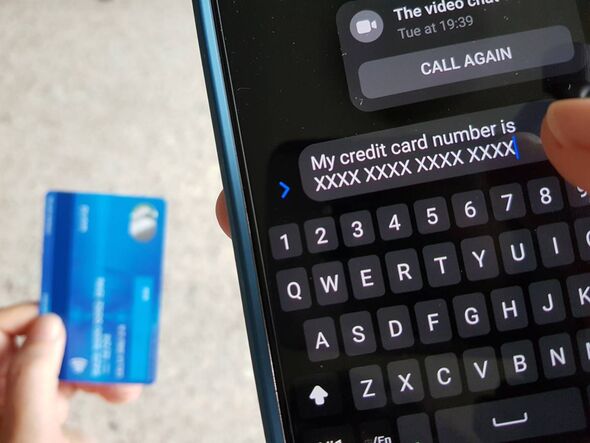
Online scam victim sending credit number to scammer (Image: Getty Images/iStockphoto)
Scammers are now using a new trick to steal money from unsuspecting victims. The latest scam, known as the “hi mum” manoeuvre, involves fraudsters pretending to be a relative in need of help. They often pose as the victim’s child, claiming they’ve lost their phone and bank card and need financial assistance.
A new Channel 5 show, Text Scams: Don’t Get Caught Out, which aired last night, explores these scams. It features a woman who was fooled by a scammer pretending to be her broadband provider’s customer service team, resulting in her losing nearly £1,000. Dr Katie Paxton-Fear, a cyber security lecturer at Manchester Metropolitan University, told the Mirror that these “hi mum” scams are becoming increasingly common.
In one shocking case, the Mirror reports that a scammer pretended to be an elderly woman’s daughter on WhatsApp. After four days of conversation, the woman transferred £3,500, believing it was for a new laptop her ‘daughter’ desperately needed.
Professor Paxton-Fear explained: “Scammers are a lot more sophisticated now, they put a lot of work into a believable story, and will very quickly decide if you’re likely to fall for more if you go for the ‘long con’ and try to befriend you,”.
“A lot of very legitimate companies actually do things in a very insecure way, your local trade-y will take payment in a bank transfer that they email you the details for, for example. We are, in a lot of ways, primed for scammers to take advantage of us.”
Also, Daniel Prince, another cyber-security professor at Lancaster University, confirmed the trend. “Worryingly we are also seeing a trend in spoofed telephone numbers with texts generated using AI pretending to be family members,” he shared with Mirror, followed by “Whilst this is infrequent, it is growing in number.”
He concluded, Typically the interaction is driven around a family member in trouble. This hooks into a strong emotional response which means it is more likely the targets of the scam interaction are more likely to respond and engage.”

Unrecognisable person working on laptop in the dark. Concept of hacking data. (Image: Getty Images/iStockphoto)
Dr Katie Paxton-Fear warns that criminals target ‘everyone’, not just parents. She explained: “They’ll go with something like ‘Hi mum my phone broke so I’m texting you from a friends phone’ – of course by using ‘mum’ they don’t need to do any research on their victims to get their name.”
“‘Which friend?’ Might get a reply like ‘You don’t know them’. They’ll slowly say ‘my bank card isn’t working and I need money for rent, can you put some in my account, I’ll pay you back once my bank card works’. They might even tell their victims to delete the ‘old’ phone number or that it’s been stolen.”
She added: “Most scams play on our good nature, we don’t want to seem rude, we want to help other people and do them a favour.” Professor Prince, who helps organisations understand cyber security, warns that other common text scams impersonate legitimate companies, such as banks or government departments.
Or they appear to offer exciting opportunities such as winning prizes or giving people good deals. “The main purpose of the initial interaction is to get individuals to interact with them,” the expert explained. “The use of texts to target individuals is just another mechanism in the toolbox of criminals to drive interactions which can then turn into fraud activity.”
“Scammers will move where it is easiest to influence or target individuals. As law enforcement shuts down or make different approaches more difficult to use, then fraudsters will jump to new tools.”
“What we tend to see is that the nature of messaging following cultural and societal key dates or holidays, such as religious holidays, large sporting events, and elections. Anything which is already at the forefront of the target group’s mind, which may lower their scepticism and make more likely they will engage with the scammers.”
So, why are text scams so believable? Prof Prince explains that it’s not just about the message itself, but also how it’s delivered.

Woman texting on her phone (Image: Getty Images)
“A text message comes in on a personal device, upon which a number of text messages from other trusted sources come in on, from friends and family,” he said. “So the individual is already predisposed to trust the text message from a scammer – it is one among a number of other trusted message streams on a device which is already trusted.”
He added: “While many phone operating system manufacturers are incorporating features to try and flag or alert potential scam messages, but novel or new framing of the message or previously unidentified source telephone numbers are no known, scam texts will get through.”
How to avoid text scams
Dr Katie Paxton-Fear warns that text scams can take many forms and advises always verifying texts before clicking any links. “Always be suspicious of friendly text messages and before you reply to new phone numbers for friends or family, ask them to verify by calling you, or giving you a piece of information not publically available, such as ‘when did we last meet?'” she said.
“Scammers mainly want easy victims, so showing scepticism or ignoring messages will usually be a sign to them to ignore you.” She also cautions never to transfer large sums of money without confirmation and to trust your instincts.
Professor Prince agrees with her advice, encouraging readers to develop a healthy sense of scepticism. “If it sounds too good to be true then it often is,” he stated. He suggests calling established numbers to confirm any information you’re given.
“Financial organisations typically only use texts to update and inform, rather than urging individuals to take action,” he added. “If you feel like you are under pressure – a common tactic of scammers – just take a step away and find a friend to check with what they think.”
- Support fearless journalism
- Read The Daily Express online, advert free
- Get super-fast page loading
He recommends removing yourself from the situation and double-checking if something feels off to avoid being scammed. “This approach of taking yourself out of the situation and double checking whether what is happening is right, is often enough to break the interaction and avoid being scammed. The other thing to think about is what you would do if you are a victim, before you become a victim.” he concluded.
Just like kids learn about fire drills at school, Prof Prince says grown-ups should have a plan for dodgy messages. He says to keep a safe list of your bank’s phone numbers.
What you should do if you’re scammed
If a scam text tricks you, tell your bank quick you might get your money back, Dr Katie explains. You can also tell the police at Action Fraud.
“If you have been a victim, while it can feel shameful, many of these scams are refined over time to be as convincing as possible. There’s a risk of falling for a few messages but as soon as a text message asks for bank details or payment, always take a step back and verify.”
“In cyber security, we use the phrase ‘Trust but verify’ a lot and I think it can apply to regular people too. It’s not about identifying and ignoring every email or text scam, but rather about how you can verify they are who they say you are.”
Prof Prince points to the National Cyber Security Centre and Action Fraud as the best places to report scams.
This article was crafted with the help of AI tools, which speed up the Daily Express editorial research. A Daily Express editor reviewed this content before it was published. You can report any errors here



